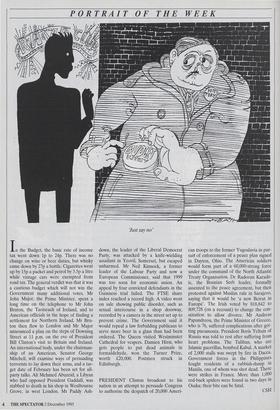PORTRAIT OF THE WEEK
Just say no' In the Budget, the basic rate of income tax went down 1p to 24p. There was no change on wine or beer duties, but whisky came down by 27p a bottle. Cigarettes went up by 15p a packet and petrol by 3.5p a litre while vintage cars were exempted from road tax. The general verdict was that it was a cautious budget which will not win the Government many additional votes. Mr John Major, the Prime Minister, spent a long time on the telephone to Mr John Bruton, the Taoiseach of Ireland, and to American officials in the hope of finding a settlement for Northern Ireland. Mr Bru- ton then flew to London and Mr Major announced a plan on the steps of Downing Street at 11 p.m. on the eve• of President Bill Clinton's visit to Britain and Ireland. An international body, under the chairman- ship of an American, Senator George Mitchell, will examine ways of persuading terrorists to lay down their arms, and a tar- get date of February has been set for all- party talks. Ali Mehmed Abuzeid, a Libyan who had opposed President Gaddafi, was stabbed to death in his shop in Westboume Grove, in west London. Mr Paddy Ash- down, the leader of the Liberal Democrat Party, was attacked by a knife-wielding assailant in Yeovil, Somerset, but escaped -unharmed. Mr Neil Kinnock, a former leader of the Labour Party and now a European Commissioner, said that 1999 was too soon for economic union. An appeal by four convicted defendants in the Guinness trial failed. The FTSE share index reached a record high. A video went on sale showing public disorder, such as sexual intercourse in a shop doorway, recorded by a camera in the street set up to prevent crime. The Government said it would repeal a law forbidding publicans to serve more beer in a glass than had been ordered. The Queen visited Westminster Cathedral for vespers. Damien Hirst, who gets people to put dead animals in formaldehyde, won the Turner Prize, worth £20,000. Postmen struck in Edinburgh.
PRESIDENT Clinton broadcast to his nation in an attempt to persuade Congress to authorise the despatch of 20,000 Ameri- can troops to the former Yugoslavia in pur- suit of enforcement of a peace plan signed in Dayton, Ohio. The American soldiers would form part of a 60,000-strong force under the command of the North Atlantic Treaty Organisation. Dr Radovan Karadz- ic, the Bosnian Serb leader, formally assented to the peace agreement, but then protested against Muslim rule in Sarajevo, saying that it would be 'a new Beirut in Europe'. The Irish voted by 818,842 to 809,728 (on a recount) to change the con- stitution to allow divorce. Mr Andreas Papandreou, the Prime Minister of Greece, who is 76, suffered complications after get- ting pneumonia. President Boris Yeltsin of Russia was told to rest after suffering from heart problems. The Taliban, who are Islamic guerrillas, bombed Kabul. A market of 2,000 stalls was swept by fire in Dacca. Government forces in the Philippines fought residents of a rubbish-dump in Manila, one of whom was shot dead. There were strikes in France. More than 1,000 red-back spiders were found in two days in Osaka; their bite can be fatal. CSH










































































 Previous page
Previous page